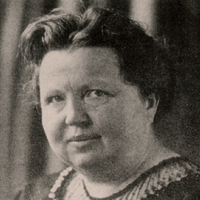Loading AI tools
Eva Fiesel, née Lehmann (born 23 December 1891 in Rostock; died 27 May 1937 in New York), was a German linguist and scholar of Etruscan.[1]
Eva Fiesel | |
|---|---|
| Born | Eva Lehmann December 23, 1891 |
| Died | May 27, 1937 (aged 45) New York City, New York, US |
| Other names | Eva Lehmann Fiesel |
| Alma mater | University of Rostock |
| Known for | Etruscan grammar, philosophy of language |
| Spouse | Ludolf Fiesel |
| Relatives | Karl Leo Heinrich Lehmann (brother) |
| Scientific career | |
| Fields | Linguistics, Etruscology |
| Institutions | University of Munich, Yale University, Bryn Mawr College |
| Doctoral advisor | Gustav Herbig |
Her father Karl Lehmann was Professor of Law and Rector of the University of Rostock from 1904 to 1905, and from 1911 in Göttingen. Her mother was the painter Henni Lehmann, and her brother Karl Leo Heinrich Lehmann became a well-known archaeologist.[1] In 1915, she married Ludolf Fiesel, a lecturer at Rostock, in Göttingen. In the winter semester of 1916–17 she enrolled at the University of Rostock.
She received her PhD in 1920 from University of Rostock on the subject of grammatical gender in Etruscan, supervised by Gustav Herbig. Fiesel divorced in 1926 and subsequently raised her children as a single mother. From 1931 to 1933, Fiesel taught as a private lecturer (Privatdozentin) at the University of Munich. In July 1933, despite protests, she lost her position there because she was a Jew by birth.[2][3]

After a long research stay in Florence with Giorgio Pasquali, she emigrated to the US with her thirteen-year-old daughter Ruth in 1934, one year before her brother Karl, at the invitation of linguist Edgar Howard Sturtevant.[2] She taught as a research assistant at Yale University, where at the time she was the only woman to hold such a role; later she was appointed visiting professor at Bryn Mawr College, Pennsylvania, an all-female, private residential College.[2] She died at the age of 46 of liver cancer, only months after the death of her mother.[2][4] [5][302]
- Fiesel, Eva. 1927. Die Sprachphilosophie der deutschen Romantiker [Philosophy of language of the German Romantics]. Tübingen: J. C. B. Mohr.
- Fiesel, Eva. 1931. Etruskisch [Etruscan]. Berlin/Leipzig: Walter de Gruyter.
- Fiesel, Eva. 1936. X presents a Sibilant in Early Etruscan. American Journal of Philology 57, 261–270.
Wikiwand in your browser!
Seamless Wikipedia browsing. On steroids.
Every time you click a link to Wikipedia, Wiktionary or Wikiquote in your browser's search results, it will show the modern Wikiwand interface.
Wikiwand extension is a five stars, simple, with minimum permission required to keep your browsing private, safe and transparent.